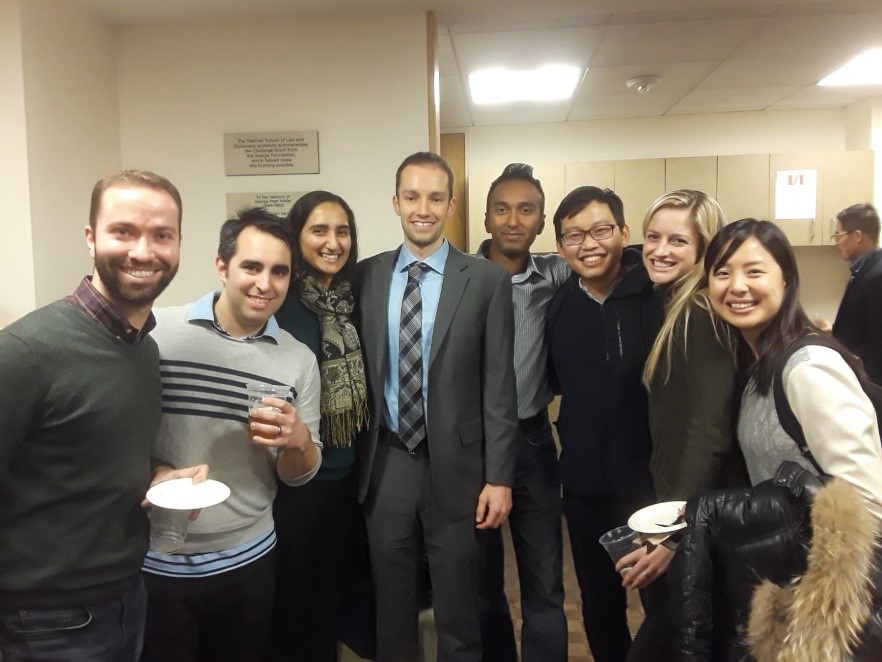Adi on MIB electives to kickstart second year
Continuing to catch up with our student bloggers following the fall semester, today we’ll hear from Adi, who is now one semester from completing the MIB program.
Now that I have officially finished the fall semester, I can reflect on what happened, while also looking ahead to my final semester at Fletcher. What was particularly different compared to my first year at Fletcher was the feeling of freedom and flexibility in choosing my courses. With most of my MIB core requirements out of the way, I see way less of MIB classmates whom I saw pretty much every day last year, while meeting new students and even fellow second years whom I never met until this semester. (Surprising as that is, it does happen.) My second year is all about electives. I do have one more requirement, but I have decided to push that to my final semester. So, my fall schedule was completely of my choosing. I ended up enrolling in the Art and Science of Statecraft with Professor Drezner, Processes of International Negotiations with Professor Babbitt, Large Investment and International Project Finance with Professor Uhlmaan, and Petroleum in the Global Economy with Professor Everett. Overall, I thought it was a fantastic mix of finance, markets, politics, and hard and soft skills, with topics that complemented each other surprisingly well.

My Fields of Study at Fletcher are International Banking and Finance as well as International Political Economy (IPE). Project Finance and Petroleum both fit my IPE Field of Study, although I think even if they didn’t, I would still have taken these two courses out of curiosity and interest. Negotiations could have satisfied my DHP requirement, but I already had a DHP course, so I took the course purely out of recognition of the importance of being an exceptional negotiator in whatever professional path I end up pursuing. Statecraft was taken out of curiosity. After all, Fletcher is a school of diplomacy, and Professor Drezner is one of the better-known names not just in the school, but in his field of expertise.
In the end, the courses were a great mix. The cases discussed in Project Finance were fantastic, ranging from aluminum mines in Mozambique to stadium public financing for the Dallas Cowboys. Petroleum was definitely an eye-opener into just how deeply ingrained petroleum is in the fabric of today’s society. I may not agree with every single perspective presented in the class, especially on the topic of petroleum’s impact on climate change (understanding Professor Everett spent years at Exxon-Mobil), but it is definitely exciting to hear a well-structured and logical argument that is counter to what I am accustomed to hearing. The two projects from Negotiation gave me the opportunity to dig deep and analyze the discussions between Indonesia and Freeport, operator of the biggest goldmine in the world. Finally, in what other class but Statecraft with Professor Drezner would you have a simulation on how countries are supposed to react in the event of a zombie apocalypse?
Thus, my suggestion for future MIB students trying to figure out what to take for their electives is to take the best courses Fletcher has to offer. Obviously, try to get any required courses out the way (in the first year if possible). I would highly recommend the four courses that I took this semester, but your interests may not be the same as mine. I only suggest that you not limit yourself to business courses at Fletcher. For MIBs, our distinguishing quality compared to MBA graduates is Fletcher’s non-business courses, whether in law, security, or even gender studies. Recognizing that these are courses that reflect Fletcher expertise would translate to us being equipped with knowledge and skills that make us unique and competitive in the job market, even as we seek MBA-type positions in consulting, investment banking, or multinational corporations. Plus, I personally find it interesting to learn about something totally outside my main area of study — it enriches the learning process.
I think many Fletcher students agree that we came here wanting an education that would give us a multidisciplinary perspective. Thus, at some point in our studies, we need to take a course that is the best Fletcher has to offer, slightly disregarding whether the topic is what we intend to build a career in. I don’t plan to have a career in conflict resolution or policymaking (although never say never), but I am confident that skills from courses on negotiations and statecraft will come in handy, even if I do pursue a career in financial services as I plan to right now.